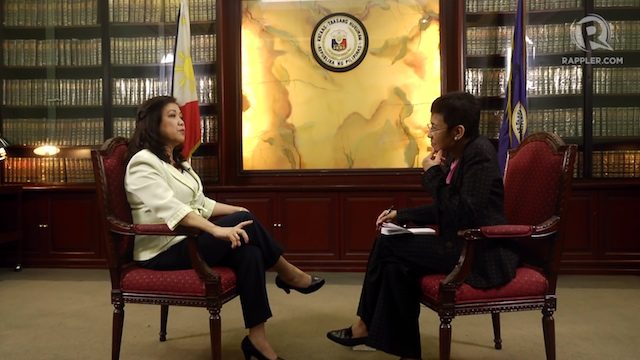SUMMARY
This is AI generated summarization, which may have errors. For context, always refer to the full article.

MANILA, Philippines – Institutions are built by people, and the Philippine judiciary is being built before our eyes.
After what may have been its lowest point about 3 years ago, when then Chief Justice Renato Corona was impeached and ousted, a June Pulse Asia survey shows the Supreme Court now has the highest approval ratings among Philippine institutions.
Much of that is because of the way 55-year-old Maria Lourdes Sereno, the Supreme Court’s first female chief, has handled herself and the Judiciary during this period of transition. (Read Part 1: Sereno: Independence is my best achievement)
Moving easily from the strategic to the tactical, she breaks down her goals: from building the infrastructure that catches and prevents wrongdoing; to crafting a reform agenda that addresses core concerns like court congestion and delays, corruption and the independence of the judiciary.
Watch Part 1 – The Chief Justice and judicial reform
In our interview, Sereno exhibits often opposing qualitites.
She is strong and weak; impenetrable and vulnerable; intellectual and emotional.
She is racing against time, and yet with an unprecedented 18 years as chief justice, she speaks like she has all the time in the world.
She is old and young.
(Read Part 2: Sereno: Justice must be real-time, high-tech)
She gives away power to consolidate power.
Sereno will work with 4 presidents until she steps down in 2030 so she wields real power. At the same time, she says the only way she can realize that power is if she can devolve and atomize it because “it must be owned by every stakeholder.”
She is pragmatic and idealistic, setting limits to the tremendous power she holds – not just for the way she handles the balance of power between the branches of government and the different groups within the judiciary, but also personally, for herself and her family.
For Sereno, the way to handle power is to set its limits.
Watch Part 2 – Chief Justice Sereno on power
Get to know the Chief Justice of the Philippine Supreme Court.
She’s not afraid to let us in. – Rappler.com
Add a comment
How does this make you feel?
There are no comments yet. Add your comment to start the conversation.